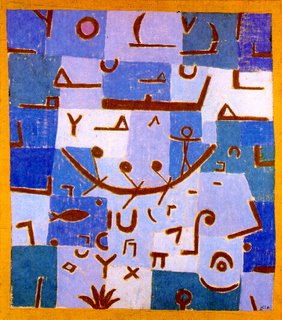Sylvester on Klee

Today I picked up a remaindered copy of David Sylvester's About Modern Art, a retrospective (as he puts it in his preface) of his long career. Sylvester died in 2001; the pieces within date from between 1948 and 2000 and are arranged loosely in chronological order. The book opens with two lucid, perceptive essays on Paul Klee, focusing on the late paintings. Some quotes from the first one:
These are pictures without a focal point. They can not be seen by a static eye, for to look at the whole surface simultaneously, arranged about its centre—or any other point which at first seems a possible focal point—is to encounter an attractive chaos. The eye must not rest, it must allow itself to be forced away from the centre to find a point at which it can enter the composition—there are usually many such points, most of them near the edge—and so journey through the pitcture, 'taking a walk with a line'On the difference between Klee's work that of the Renaissance tradition (conceived broadly):
A Renaissance picture is a building, an established and complete entity. A Klee is an organism in growth. A building cannot develop of itself; it can only be changed by outside forces. An organism has a future as well as a past. Likewise, a picture by Klee goes on becoming not only while he cultivated it but while you cultivate it...To look at a Klee over a period of time is not to acquire a deeper understanding of the finished thing but to observe and assist in its growth.In the preface, Sylvester admits a distaste for Klee's "fantasy and humour", finding them "rather heavy". While I must respectufully disagree (and isn't levity a strength of his best work?), his focus on phenomenology—as opposed to symbolism and narrative—is enlightening and fun to read.
Klee, whom I've mentioned before, is the subject of a current exhbit at New York's Neue Galerie. You can read more about it in this New York Times piece. I'll have to go down and take a look, won't I?
In other art-bookery, sociologist Howard Becker, author of the classic Art Worlds, has edited a new book entitled "Art from Start to Finish: When Is An Art Work Done?" A table of contents and three essays—including a feisty one by Becker himself—can be found online. Here's another sample. The book, to be released in May according to amazon, looks intriguing.


0 Comments:
Post a Comment
<< Home